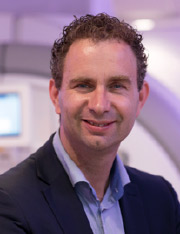October 5, 9:30 am
Fluno Center
Seminar title:
Deep Imaging: impact of AI-empowered image reconstruction, diagnosis and prognosis
Synopsis:
Machine learning, and especially deep learning is a disruptive technology in the field of medical imaging, impacting medical image acquisition, reconstruction, analysis, and image-based diagnosis and prognosis. In this presentation examples of recent advances of the use of machine learning in these fields will be presented, along with the challenges we face in order to successfully introduce them into clinical practice. I will provide examples showing that the use of AI and big data has large potential to make steps towards precision medicine and precision health, i.e. taking individual variability into account in treatment selection.
Specifically, in dementia research, I will show how large scale data analytics in longitudinal population neuroimaging studies, especially when combining imaging with other clinical, biomedical and genetic data, provides a unique angle to study the brain, both in normal ageing and disease, and how this can assist in clinical decision making. I will also discuss the promise and challenges of using state of the art artificial intelligence techniques as deep learning in this domain, to improve diagnostics and prognostics. As a second example I will show how radiomics and deep learning approaches can be used to improve tumor characterization and therapy selection and guidance in oncology, and also here the enormous potential and pitfalls of using artificial intelligence in the interpretation of these data will be discussed.
Finally, I will discuss the concept of end-to-end learning, i.e. going directly from the raw data to the end goal, for example disease classification or prognosis. This approach poses the intriguing question whether in medical imaging we always need to reconstruct an image, or whether in certain cases we can directly work from the raw data.

Wiro Niessen, PhD, is full professor in Biomedical Image Analysis at Erasmus MC, Rotterdam where he leads the Biomedical Imaging Group Rotterdam (www.bigr.nl) and at Delft University of Technology.
His interest is in the development, validation and implementation of quantitative image analysis methods in clinical practice and biomedical research, in linking imaging and genetics data, radio(geno)mics, and image guided interventions. Focus areas are improved diagnosis and prognosis of neurodegenerative and cardiovascular disease, and treatment guidance in oncology, by developing and using advanced medical image analysis and machine learning methods. He has published over 300 journal articles in these areas, and has a H-index of 73 (Google Scholar).
He is fellow and president of the Medical Image Computing and Computer Assisted Interventions Society (MICCAI), director of the Biomedical Image Analysis Platform of the European Institute of Biomedical Imaging Research (EIBIR), member of the International Society of Strategic Studies in Radiology (IS3R), board member of the Technological Branch of the Netherlands Organization of Scientific Research (NWO-TTW) and Chief Digital Officer of Health RI, a national research infrastructure for prevention, personalized treatment, and health.
In 2012 he founded the spin-off company Quantib, which develops methods to automatically extract relevant information from medical imaging data, and he is currently the Scientific Lead at Quantib.
In 2015 he received the Simon Stevin Master award, the largest prize in the Netherlands in the field of Applied Sciences. In 2017 he was elected to the Royal Netherlands Academy of Arts and Sciences.